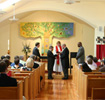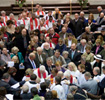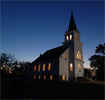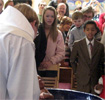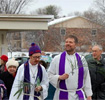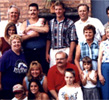
Tradition , interrupted
Steve Dornbusch
Golden Valley, MN "...whether congregations are talking about this or not, their people are, and they are making decisions." |
↓ Interview
Pastor Steve Dornbusch at Calvary Lutheran Church in Golden Valley, Minn. (Video by Anna Weggel, Public Insight Network and Gabriel Diamond, Outside Films) Steve Dornbusch is pastor at Calvary Lutheran Church in Golden Valley, Minnesota. He and the majority of his congregation opposed last August's vote, and have held a vote of their own—the first of two needed to disaffiliate from the ELCA. But Calvary Lutheran Church will not fully separate. Instead, with the guidance of several former church presidents, it is going to legally and constitutionally distance itself from the ELCA, but remain connected in a partnership. Dornbusch says it's like going from a "parent/child relationship to an adult/adult relationship." He frequently hears from Lutherans who have left other ELCA churches and are searching for a new church. "It has been a disaster in countless congregations," he says. Personally, Dornbusch says, it's been a time of discernment. "I have found myself focusing more strongly on Scripture," he says, "and discerning Scriptural guidance for my actions and that of my congregations." Dornbusch says that "whether congregations are talking about this or not, their people are, and they are making decisions." |
Pastor Mary Albing
Minneapolis, Minn. "Our mission is clear and we are not divided." |
↓ Interview
 Pastor Mary Albing baptizing Jean-Claude Glissou on Dece. 6, 2009. "The people behind him are gay, straight, young, old, and first, second, third and fourth-generation immigrants. It shows the humor, diversity and love in a progressive congregation." (Photo courtesy of Pastor Mary Albing) Mary Albing is a "very out" lesbian pastor at Lutheran Church of Christ the Redeemer in Minneapolis, Minnesota—and has been an influential voice for change in the church. Despite being a lesbian, she was "rostered" (called to serve) at her church through a special process called Extraordinary Candidacy. But she wasn't officially called to serve as clergy until late May of 2010. Things have calmed down at her church since the vote, and where other congregations remain divided, she says hers is unified. She advises congregants on how to talk with conservative family members about the issue. She sees the vote and the resulting split as yet more evidence of "the divide in our country as a whole. The polarities seem sometimes to be widening," she says. She recalls a couple from Iowa who often used to visit her church, which is near their daughter's house. "They are friendly, wonderfully warm people," Albing says. "But the last time, he didn't come with his wife. 'It's the vote,' she told me. 'We are leaving the ELCA.' And I haven't seen them since." Beyond the religious questions there is also a practical economic concern. Albing says the split in the church will likely have a big effect on church finances. "With the current fiscal challenges of every nonprofit organization," she says, "this additional strain is already costing jobs at our synod and churchwide offices and will almost certainly affect programs as well." But at Albing's church, finances are actually quite strong. "Since our mission is clear and we are not divided," she says, "our congregation is doing well financially." She sees the vote as another stride in the movement to provide all Americans with equal civil rights. "The same kinds of arguments being made about gay people today were made over the years about slavery, marriage between races and women's leadership," she says. And she says those who opposed the vote on biblical grounds let their "biases color their theology." She says "Lutheran theology has traditionally not only used the Bible, but our experience and reason to help us make theological and ethical decisions. Common sense and hard and soft sciences all tell us that gay people are just created the way they are and that our business as the church is to help them as they try to have lasting and meaningful relationships and live out their vocations in the world." |
Daniel Hannemann
Winchester, VA "I have had a long, depressing period of very serious soul-searching, and haven't the slightest doubt about my convictions." |
↓ In their words
Daniel Hannemann of Winchester, VA says there is a lot of "hurt, confusion and discussion" at his church, where he serves as the full-time director of music and is an organist. His church voted to stay affiliated with the ELCA -- a decision he feels has no biblical basis. He's 59 years old. "As an older staff member in complete protest with the decision, I would be voluntarily long gone, but have no place to go for another job, and have a mortgage to pay. Due to the economy I cannot afford to move, so like Martin Luther, 'Here I stand -- I can do no other.' "I have had a long, depressing period of very serious soul-searching, and haven't the slightest doubt about my convictions. "I feel as though I'll be working in this congregation until my retirement, but that it will no longer be "my church". My offerings are all now going elsewhere, to ministries where the truth of the Bible is valued." |
In The Spotlight
-
The Current Music Blog
Your daily note for good music, news and pop culture. With attempted jokes.


